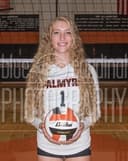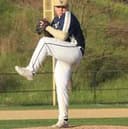Hutch Lynott '22 Recruiting Profile

Video
 PA Regionals
PA Regionals  PA Districts (Qua...
PA Districts (Qua... PA Districts
PA Districts  League Championship
League Championship  AH v. Wallenpaupack
AH v. Wallenpaupack Personal Statement
Two gladiators enter a ring. Only one can leave victorious. This is, of course, a high school wrestling match. One shoots in on a single-leg takedown. The opponent defends. Then, a crack echoes through the crowded gym and the warrior collapses. This was my experience earlier this year when a fibula ankle fracture and a syndesmotic ligament tear pulverized my Junior year wrestling season. I was supposed to end the season on the podium at states, not on crutches! The surgically implanted titanium tightrope and extensive three-month recovery crushed my hopes and dreams of becoming a one hundred win Abington wrestler.
Less than a year before, I had stepped into a similar ring against some of my best competition at the State Tournament. I had lost my first match and needed to win the next two to stay in the game. I kept a cool head. My team needed me to be a leader by keeping the morale high and strategizing detailed game plans against different opponents with them. Reducing the game to a science, I won my next two matches using a variety of methodical techniques. Finally, my shot came; this was the match that I had to win to qualify for the Regional Tournament, a goal that I had set early in my wrestling career. I went out onto the mat with confidence. The whistle blared and my opponent took me by surprise, tackling me at my legs. My heart sank. He lifted me into the air deftly. In the heat of the moment, I remembered a novel wrestling maneuver that I had kinesthetically trained only weeks before. Suddenly, I implemented it by counterintuitively rolling headfirst at his heel using his momentum and anatomy against him to win the match. Wrestling has taught me perseverance and dedication, but it has simultaneously taught me how to make quick decisions and stay focused under pressure. These were the characteristics I needed to make a comeback off the mat after my injury.
“In some ways suffering ceases to be suffering at the moment, it finds a meaning…”, concludes Austrian psychiatrist Victor Frankl in his book, Man’s Search for Meaning. I began to see my setback as a part of my journey toward finding ways to improve sports medicine by using computerized devices. I seized my time healing as an opportunity to grow academically when I couldn’t grow athletically. I answered the call to help the Science Olympiad team compete, something I had to turn down in previous years because it directly conflicted with wrestling practices and tournaments. I also delved deeper into my computer science class with my brother and prepared to crush the CompSci AP Exam, which I did. Now, a year later I’m back on the mat, leading my team as captain and with the highest number of wins on the team this season.
I like to think of my leg as bionic and stronger than it was before. I want to develop technology like this in the future to help make peoples’ lives stronger than before. The idea of implanting foreign devices into the human body makes me wonder how far we can go with sci fi type procedures to make the human body more capable than before. The idea of using computers inside the body and on the outside as wearables to affect our perception of touch, like the research can be life-altering. I would love the opportunity to contribute to such research and to learn even more cutting edge uses for computer science, like advancements in the quantum internet. These are fields I want to explore and utilize in my pursuit of a career that fosters the continued development and improvements in the biology of the athlete while pushing myself to and past my limits both academically and athletically.
*My previous statement prior to injury:
In my district tournament during my Sophomore year, I was crushed after my first defeat of the day. I went on to win four matches in a row to qualify for the Regional Tournament going on to earn more wins for my record. Throughout this experience, I learned the importance of determination and heart which are applicable to all facets of life.
My coaches also recognized my intense work ethic this season by awarding me at our virtual team banquet with awards of both “Most Improved” as well as the coveted “Golden Jock Award” for toughness chosen by coaches who have been coaching at Abington so long that they coached the fathers of some of my peers.
Not only do I strive for excellence on the mat, but I also toil in the classroom to earn top marks. As a scholar-athlete that season, I was selected for the First Team State All-Academic Team with a GPA of 103 and a PSAT score of 1380. I was also selected as a Lackawanna League Division 1 2nd Team All-Star. With two more years, I know my achievements will only grow.
I am working as diligently on my academic performance as my wrestling because I aim to attend medical school after college and ultimately become a surgeon. I believe pairing my education with a sport will keep me focused. My high ideals will keep me performing at peak capacity. I know I will be an asset to any team that chooses me.
Athletics
High School Information
- Years w/ Varsity
- 2 years
- 2020 Varsity Team
Individual Awards
- 2nd Team All-County, Division 1 Lackawanna League Wrestling 2nd Team All-Star and District 1st Team All-Academic
- 2019 Varsity Team
Team Awards
- Conference 2nd Place, Sectional 3rd Place
Coach References
- High School Head Coach
- Stephen Peters
- High School Head Coach
- Greg Theony
Additional Sports
- Football
- 10 years
- Varsity Team
- NAJFL Championship
Statistics
Academics
Grades
Test Scores
Academic Accomplishments
Are you in honor classes?
Yes.Are you in AP/IB classes?
Yes.Registered with the NCAA Eligibility Center?
YesAwards and Activities
- AwardsNational Merit Scholar First Team Academic All-State, State Qualifier Future Business Leaders of America 3rd Place in the Region, All A's throughout Middle School, Honor Roll throughout High School Science Olympiad (Anatomy and Physiology, Designer Genes, Protein Modeling)
- ActivitiesBiology Club (President) Future Business Leaders of America (Officer) National Honor Society (PR) German Club (Historian) Volunteer Coaching for Youth Wrestling, Transition Team Science Olympiad (Anatomy and Physiology, Designer Genes, Protein Modeling)
Top NCSA Athletes at Abington Heights High School




Top NCSA Athletes in Area




